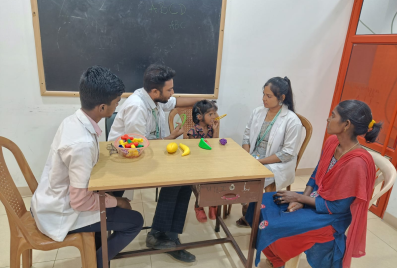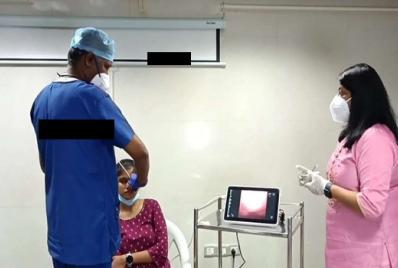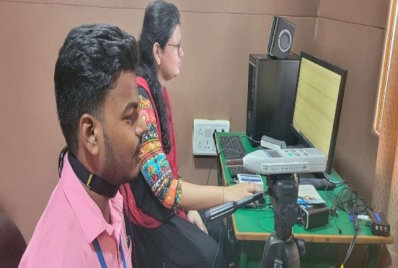Neuro clinic
The neuro clinic provide dedicated services for the assessment and management of various congenital and acquired neurological communication disorders which includes cerebral palsy, childhood Apraxia of speech, adult language disorders, motor speech disorders and dysphagia. The services are provided with the help of well trained speech language pathologist with the use of highly sophiscated materials like Western Aphasia Battery, Frenchey Dysarthria Assessment, Manipal Manual of Cognitive Linguistic Assessment, Manipal Manual Of Swallowing Assessment, Minimental State Examination, Quick Neurological Screening test
Services offered:
- In depth assessment and diagnosis of various neuro communication disorders.
- Early intervention for various neuro communication disorder.
- Caretaker training.
- Home training
Aphasia: What is it?
Speaking and understanding what other people say can be difficult if you have aphasia. It typically occurs as a result of brain injury to a specific area of the brain, but it can also occur from illnesses that impair brain function. Aphasia also comes in several forms. The kind of aphasia you get depends on where in your brain the damage is located.
Almost invariably, this illness is a sign of another issue, like a stroke or traumatic brain injury. It may also occur as a transient side effect of diseases like migraines. Aphasia is frequently curable, particularly if the underlying ailment is also curable or self-healing.
What differs aphasia from dysarthria, dysphasia, and apraxia?
Dysarthria, dysphasia, and apraxia are a few other speech-related disorders and issues that are linked to or overlap with aphasia.
Aphasia
Aphasia is the general word for brain-related language impairment, such as difficulty speaking or comprehending what others are saying. Experts use this phrase to describe a total or partial loss of language skills.
Dysphasia
The term dysphasia (dis-fay-zh-ah) refers to a partial loss of linguistic ability resulting from a brain-related issue. It is no longer in use. In most regions, this term is used sparingly.
Dysarthria
Dysarthria is a condition in which you have difficulty speaking due to partial paralysis of the lips, face, and upper respiratory tract. This may cause you to talk incoherently, too loudly or too softly, at different speeds, enunciate words incorrectly, or exhibit strange pitch shifts.
Apraxia
Apraxia is the inability to perform an action despite having learned how to do it or having performed it previously. An example would be unexpectedly losing the ability to use a skill.
Who is affected by it?
Anyone who suffers brain damage that affects the regions responsible for controlling their capacity to talk or comprehend others when they speak can develop aphasia. Although it can occur at any age, it is more common in middle-aged and older persons, particularly due to illnesses like stroke.
Signs and Causes
Experts use three criteria to identify the type of aphasia: understanding, fluency, and repetition.
Your aphasia type will vary based on how it interferes with your speech and comprehension of others. Experts classify your aphasia according to whether or not it causes difficulties with understanding, fluency, or repetition.
What causes aphasia?
Any illness that affects the brain can cause aphasia. It can also occur when there are issues that interfere with the way your brain works. Among the potential reasons for this are:
- Alzheimer's disease
- Aneurysms
- Brain injury
- Brain tumors (including cancer)
- Cerebral hypoxia (oxygen deficiency-related brain injury)
- Traumatic brain injury and concussion
- Dementia (including frontotemporal dementia)
- Seizures or epilepsy
- Genetic disorders
- Brain inflammation from bacterial or viral infections
- Migraines (as a transient side effect)
- Chemotherapy or radiation therapy
- Poisons and toxins
- Strokes or transient ischemic attacks (TIAs)
Management and Treatment
Is there a cure for aphasia, and how is it treated?
Sadly, there is no known treatment for aphasia. Nonetheless, there are usually treatments available. Addressing the underlying illness is typically the first step toward addressing aphasia. In certain cases, such as strokes, prompt restoration of blood flow to the damaged brain region can minimize or even reverse irreversible damage.
Dysarthria
Dysarthria can be acquired or developmental. It can result from brain injury, neurological disorders, or other causes affecting muscle control. Treatment usually involves speech therapy.




